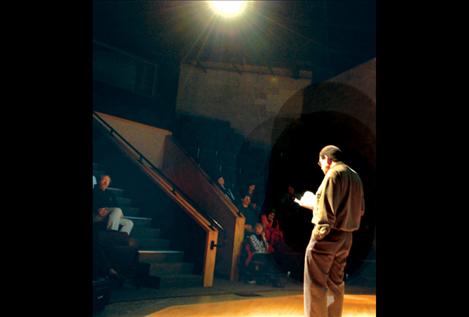Civil rights talk part of college’s MLK celebration
Hey savvy news reader! Thanks for choosing local.
You are now reading
1 of 3 free articles.
PABLO — Dr. George Price came to Salish Kootenai College on Wednesday to discuss the relations between Native Americans and African-Americans throughout history, as well as his take on the role of successful activism at a time when the “Idle No More Movement” is gaining precedence in and around the Flathead Reservation. More than 100 people attended the event, which was a feature of Martin Luther King Jr. Week at the college.
The event was kicked off with a piece by the North Lake Singers drum group before Price, a professor at the University of Montana since 1998, was introduced.
He drew comparisons between the treatment of Native cultures and that of African slaves brought to America by Europeans throughout North American white history, often drawing from his own Wampanoag ties to highlight his points.
Dr. Marin Luther King Jr. led the Civil Rights Movement, which is often thought of as the catalyst to African-Americans gaining rights and freedoms in this country, but as Price pointed out, the Native Americans were right alongside them as “allies (and) adversaries, enslaved together, escaping slavery together.”
According to Price, much of the intermixing between African-Americans and Native Americans happened in certain areas of the United States, namely New England, the Southwest, the Great Plains, and the Appalachian Mountains.
“There was also a fair amount of mingling in the Caribbean, especially the Bahamas,” Price said.
Price considers himself a homegrown product of the Flathead Indian Reservation. He worked as an educator at both Salish Kootenai College and Two Eagle River School, where he taught history for 10 years before moving on to his post at the University of Montana in Missoula. He now teaches courses in African-American studies, Native American studies and history.
“I am very thankful for the hospitality of the Flathead Indian Reservation,” Price said of his upbringing.
Although Price identifies closely with his Wampanoag heritage, he clarified that it is more than the hospitality of the Flathead Indian Reservation that helps him identify with the Flathead Indians; the tribes face many of the same problems. The language of the Wampanoag is in danger, just like the languages of many other tribes across the nation.
“It doesn’t mean it’s the end of the story,” Price stressed.
He is confident that through the tools of education first founded by the pre-European Native Americans and then utilized by the late Dr. Martin Luther King, we can fix this problem, and Native tongues can live on.
Price expressed optimism about recent activism on the reservation, such as the Idle No More movement, a peaceful movement started by Native peoples in North America as a reaction to alleged abuses of treaty rights by the Canadian government. He advised that education and “teach-ins” held by King himself were vitally important to the Civil Rights Movement, which perpetrated ideals originally held by Native Americans.
“The power of the ’60s came through well-informed and peaceful movements,” Price said.
That doesn’t mean activism is quiet, however. As Price put it, “I’ve been at (activism) for a long time. If you’re an activist, you have to get a little worked up.”
Citing once again the beginnings of the Civil Rights Movement, he closed his talk with the words, “You do it because it’s right, whether you think you will succeed or not.”
(Editor’s note: Polson native Peregrine Frissell is a freshman studying journalism at the University of Montana.)
















